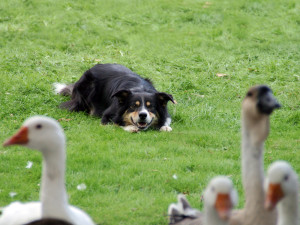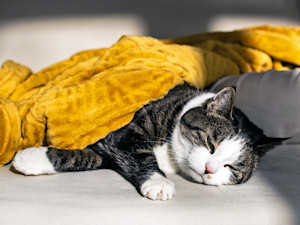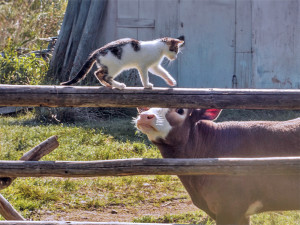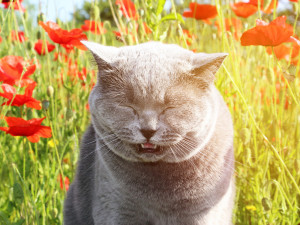Cats May Become Bird Flu Carriers, New Study Warns
With bird flu cases on the rise, scientists are worried the virus could mutate.
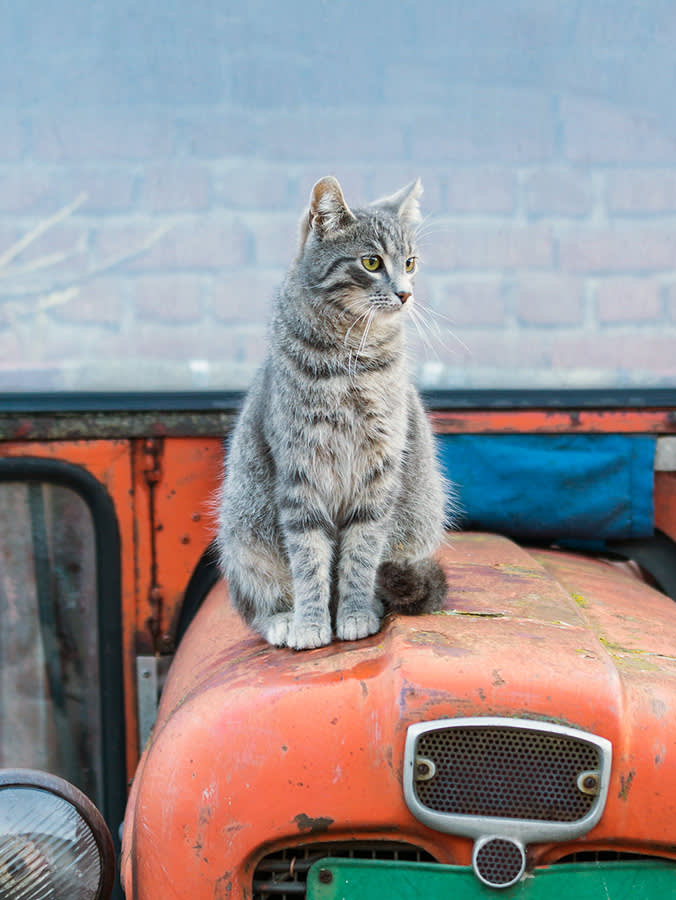
Share Article
Bird flu is back in the news, proving to be a concern for both animals and people; this week alone, an Arizona zoo announcedopens in new tab that five animals (a cheetah, a mountain lion, a swamphen, an Indian goose, and a kookaburra) passed away after being infected with the virus, and a child in California is being tested for bird fluopens in new tab after becoming sick after drinking raw milk. While the risk to humans remains low, scientists are becoming concerned that H5N1 (aka “bird flu” or “avian influenza”) could mutate, becoming more contagious. A new studyopens in new tab published in Emerging Microbes & Infections found that cats may be carriers for bird flu, creating opportunities for the virus to evolve.
As of now, there have been 58 confirmed cases of bird flu in humans since 2022, reports the Centers for Disease Control and Prevention (CDC).opens in new tab The infections are due to exposure to infected wild birds, poultry, and dairy cows. It is extremely rareopens in new tab for humans to be infected by mammals, including other humans.
No cat has spread bird flu to a human during this outbreak. But in the latest research, scientists warn that mutations could cause bird flu to become more contagious, and cats could serve as carriers of the infection. If cats were infected by both H5N1 (which is very contagious between birds) and the seasonal flu virus (which is very contagious between humans) at the same time, bird flu could evolve to be more easily transmissible between mammals. Many animals are able to host both H5N1 and the seasonal flu virus at once, but cats are closest in proximity with humans, so scientists are concerned about the risk of mutation in companion cats.
While the USDA monitors infections in livestock and the CDC monitors infections in humans, the New York Times reports that no government agencyopens in new tab tracks infection in companion animals. Scientists are warning health officials that surveillance in cats may be necessary. “In the process of addressing the immediate problem — which is dairy farms and the milk as a food safety problem, and then human surveillance — we might be missing a much bigger, evolving story,” Dr. Suresh Kuchipudi, a veterinary microbiologist at the University of Pittsburgh and one of the researchers on the study, told The NY Times. “It may already have been happening in plain sight.”
Bird flu in cats
Throughout the year, outbreaks of bird flu in cats have been making the news. Back in April, cats who lived on a dairy farm became sick with H5N1 after consuming raw milk.opens in new tab In August, health officials were concerned when two cats who had never been outsideopens in new tab fell ill with H5N1 (it is still unclear how the cats became infected, but veterinarians propose they may have had exposure to an infected mouse, an asymptomatic human, or tracked-in secretions from an infected animal). According to the United States Department of Agriculture (USDA),opens in new tab at least 53 domestic cats in the United States have contracted bird flu since late 2022.
There is no need to panic: It is still very rare for cats to become sick with bird flu. That said, if your cat is in contact with wild birds, poultry, or dairy cows, or lives near an area where there has been a reported outbreak, it is important to keep an eye out for symptoms of H5N1. “Some signs could include feveropens in new tab, lethargy, difficulty breathing, coughing, runny nose, and/or signs of conjunctivitis which includes red eyes, eyes that appear squinty or sealed shut, and/or eyes with goopy greenish yellow discharge,” veterinarian Dr. Amy Fox told us.opens in new tab
If your pet shows symptoms of bird flu after potential exposure, they should immediately receive veterinary attention. The CDC recommends that cats and humans do not consume raw milkopens in new tab and avoid exposure to wild birds or potentially infected animals.

Sio Hornbuckle
Sio Hornbuckle is the Assistant Editor at Kinship, where they frequently write for the site. As a writer, they specialize in pet news, animal science, and pop culture. They live in New York City with their cat, Toni Collette.
Related articles
![Dog on ground looking at geese]()
What to Know About Bird Flu in Cats and Dogs
Several cats and one dog in North America have died of the virus. Here’s how to keep them safe.
![Cat sleeping at home in the sun.]()
Bird Flu Is Infecting Cats Across The Country—Including Indoor Ones
Nearly 40 domestic cats have been infected with bird flu—two of which have never been outside.
![Calf looking up at a cat on a farm.]()
Cats Who Consumed Raw Milk Died From Bird Flu, Reports the CDC
Unpasteurized milk can transmit avian influenza from cows to mammals.
![A happy woman is lying on a bed, her dog smelling her face.]()
9 Diseases You Can (and Definitely Can’t) Catch From Your Dog
Here’s what you can scratch off your “Worry About This” list.
Can Cats Actually Get the Common Cold?
They’re not exactly blowing their noses and rubbing Vicks on their chests, but here’s what you need to know.
Can Humans Get Cats Sick? What Science Says
What about the other way around?
